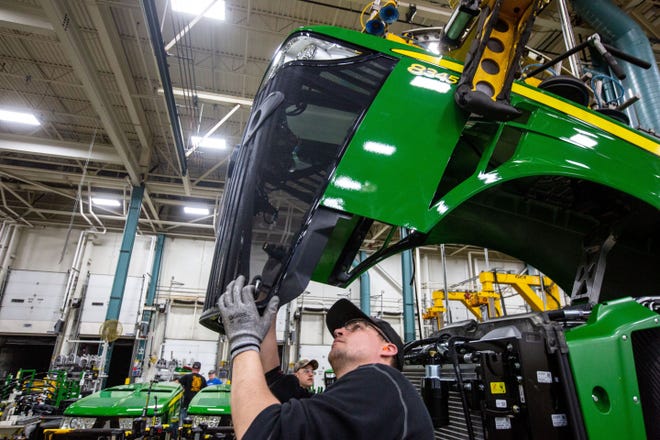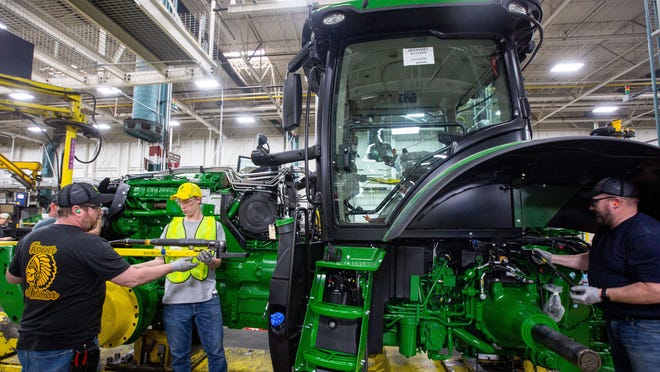Donnelle Eller
Des Moines Register
Deere & Co says it has begun negotiating a new labor contract with the UAW that will cover about 10,100 employees, including about 7,200 production workers in Iowa.
Based in Moline on the Illinois side of the Quad Cities, the manufacturer of tractors, combines and other farm and construction equipment said the existing six-year master contract ends Oct. 1. It sets pay and benefits for employees at Deere facilities in Illinois, Kansas and Iowa.
“We look forward to honoring the contributions of our employees through the bargaining process and reaching an agreement that demonstrates a vision for our shared success — and the success of all those who rely on us — well into the future,” Brad Morris, Deere's vice president for labor relations, said in a statement.

The contract negotiations come as Deere reports record earnings the first half of the year. Powered by high commodity prices and strong demand, Deere earned $1.2 billion in the first quarter and $1.79 billion in the second quarter. The previous record was $1.08 billion in the second quarter of 2013, the company said.
MORE: Everybody wants a John Deere tractor. But not everybody wants a John Deere job. Why?
It plans to release its third-quarter earnings Friday.
The Iowa facilities covered under the Deere contract include the Davenport, Des Moines, Dubuque, Ottumwa and Waterloo works.
Facilities under the contract in Illinois are the Harvester Works in East Moline, North American Parts Distribution Center in Milan, and the seeding group and cylinder division in Moline. In Kansas, there is one facility: Coffeyville Works.

Workers are represented by the International Union, United Automobile, Aerospace, and Agricultural Implement Workers of America.
Deere said it's worked with organized labor to "provide competitive compensation and rewarding careers allowing employees, their families and communities to prosper."
UAW and John Deere meet to negotiate on how to ram through a sellout contract
On Tuesday, the world’s largest agriculture machinery company, Deere & Company (John Deere), announced it had opened contract negotiations with the United Auto Workers (UAW). The current six-year contract, ratified in 2015, expires on October 1, 2021. The new contract covers some 10,100 workers from plants in Illinois, Iowa and Kansas.
During the 2015 contract negotiations the WSWS wrote, “The UAW is going to sell you out.” This proved correct in 2015, and the union is preparing an even worse betrayal now. In fact, the company and the union already have their contract, worked out behind closed doors. The only thing Deere and UAW are really “negotiating” is how to ram it through the workers.
The UAW and Deere are developing their strategy; John Deere workers need theirs. This requires the establishment of rank-and-file committees at every plant. Workers must take matters in their own hands and not wait for what they know is coming.
The 2015 contract demonstrates that the UAW has no business claiming that it “represents” workers at Deere. The agreement was rammed through without workers having a chance to even look at it. They were only given a self-serving, 17-page “highlights” document distributed the day workers were to vote—with just two hours to consider it!
The contract maintained the hated two-tier system and increased out-of-pocket costs for health care. It included a pathetic $3 wage increase over the six-year span of the contract. Exploiting the economic hardships caused by previous UAW-backed concessions, Deere and the UAW attempted to lure workers into voting “yes” with a $3,500 sign-on bonus.
The UAW’s announcement of the agreement’s ratification was met with outrage by workers, who repeatedly demanded a recount and revote while the union responded to their demands with silence. The WSWS received a document from workers that stated the contract was passed by a margin of only 180 votes.
The 2015 deal was the latest in a long series of concessionary contracts rammed through by the UAW at Deere, which were used as models for the entire auto industry. This included the 1994 and 1997 contracts, which introduced and expanded the hated two-tier wage and benefit system.
The 1997 contract agreement was also the first six-year contract, doubling the period between negotiations, which granted enormous leverage to Deere. These contracts and every one that followed contained minimal wage increases entirely eaten up by inflation.
In 2009, the UAW executives patted themselves on their backs after announcing they secured an agreement with Deere that would prohibit plant closings for the duration of the contract. But the agreement did nothing to stop layoffs. In 2015, under the 2009 contract, Deere laid off 910 employees at plants in Iowa and Illinois, almost matching the 1,000 workers they laid off in 2014. Since then, thousands more have been laid off.
Lessons of the Volvo strike
The UAW is not a workers organization but an instrument of corporate management. In recent years it has been engulfed in a corruption scandal that has exposed the fact that its top executives stole workers’ dues money and accepted bribes in exchange for pushing through pro-company contracts.
So far, 12 UAW officials, including two of the last four union presidents, have pleaded guilty to various charges stemming from the investigation, including former UAW Vice President Norwood Jewell, who oversaw the 2015 Deere contract.
John Deere workers should take their lead from the workers at Volvo Trucks in Dublin, Virginia, who in the course of their struggle formed a rank-and-file committee to fight for their interests against both management and the UAW.
In June and July of this year, the nearly 3,000 Volvo Trucks workers waged a five-week-long strike, which the UAW was forced to call after workers rejected by 90 percent two sellout contracts. After the workers voted down the third contract, the UAW had them vote on it again just days later, claiming that it ultimately passed by just 17 votes.
The UAW shut down the strike and declared the new contract valid. The new contract included higher out-of-pocket health care expenses, forced younger workers to work six years or more to reach top pay and continued forced overtime. Raises for the top paid workers average only 2 percent a year, well below the current rate of inflation of 5.4 percent.
At every instance, the UAW sought to end the strike. It isolated it and maintained a blackout of information on contract negotiations. But workers fought back against the UAW’s attempt to sabotage their struggle and formed the Volvo Workers Rank-and-File Committee (VWRFC). The VWRFC broke the UAW’s news blackout and isolation of the strike and garnered support from autoworkers in Detroit and other cities, Mack Trucks workers and Belgian Volvo workers.
Reflecting on the struggle at Volvo, the VWRFC stated, “A real movement of workers must come from the bottom, not from the bureaucracy. The building of a powerful rank-and-file movement—of the workers, by the workers and for the workers—is the task facing all workers everywhere.”
Organize a rank-and-file committee!
Many Volvo workers expressed the sentiment: We wish we had the rank-and-file committee earlier! That is the task now at Deere. Deere workers cannot sit back and wait for the inevitable betrayal. Now is the time to organize and mobilize to advance and fight for your own demands.
For the UAW, the contract “process” is as follows: Management says what it wants, the UAW agrees, and the workers must accept what they are given. This must end now!
A rank-and-file committee should begin by formulating demands that meet workers’ real needs, including:
- An end to the two-tier system, with all workers brought up to top pay and benefits
- A 30 percent across-the-board pay increase to make up for the years of wage freezes and stagnation
- An annual cost-of-living escalator clause to keep up with spiking inflation
- Fully paid health care benefits for retirees, with no co-pays or premiums
Workers should demand now that all negotiations between the UAW and the company be open to workers’ representatives. No to backroom negotiations! And if any contract is reached, workers must have it in full, with two weeks to discuss and study it before any vote.
Deere workers face a powerful and experienced corporate conglomerate, which is determined to siphon as much of the wealth produced by the workers to the shareholders. But workers have powerful allies among the working class in the US and around the world whose numbers are far more numerous and collectively contain immense strength
No comments:
Post a Comment